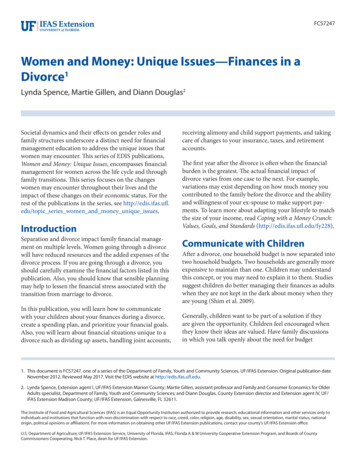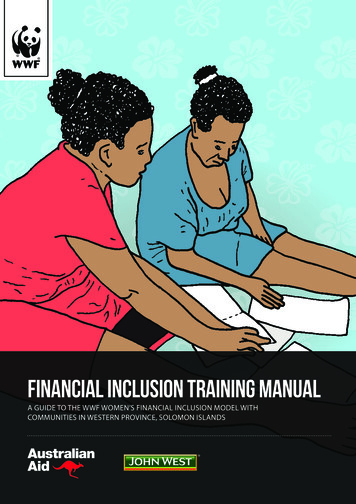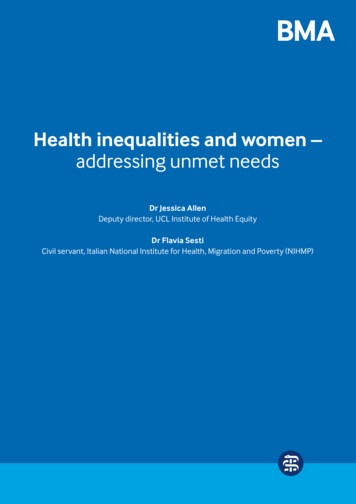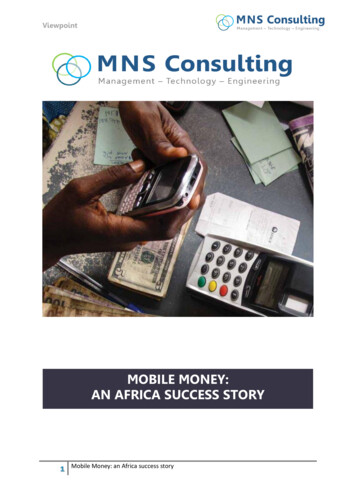
Transcription
FCS7247Women and Money: Unique Issues—Finances in aDivorce1Lynda Spence, Martie Gillen, and Diann Douglas2Societal dynamics and their effects on gender roles andfamily structures underscore a distinct need for financialmanagement education to address the unique issues thatwomen may encounter. This series of EDIS publications,Women and Money: Unique Issues, encompasses financialmanagement for women across the life cycle and throughfamily transitions. This series focuses on the changeswomen may encounter throughout their lives and theimpact of these changes on their economic status. For therest of the publications in the series, see http://edis.ifas.ufl.edu/topic series women and money unique issues.IntroductionSeparation and divorce impact family financial management on multiple levels. Women going through a divorcewill have reduced resources and the added expenses of thedivorce process. If you are going through a divorce, youshould carefully examine the financial factors listed in thispublication. Also, you should know that sensible planningmay help to lessen the financial stress associated with thetransition from marriage to divorce.In this publication, you will learn how to communicatewith your children about your finances during a divorce,create a spending plan, and prioritize your financial goals.Also, you will learn about financial situations unique to adivorce such as dividing up assets, handling joint accounts,receiving alimony and child support payments, and takingcare of changes to your insurance, taxes, and retirementaccounts.The first year after the divorce is often when the financialburden is the greatest. The actual financial impact ofdivorce varies from one case to the next. For example,variations may exist depending on how much money youcontributed to the family before the divorce and the abilityand willingness of your ex-spouse to make support payments. To learn more about adapting your lifestyle to matchthe size of your income, read Coping with a Money Crunch:Values, Goals, and Standards (http://edis.ifas.ufl.edu/fy228).Communicate with ChildrenAfter a divorce, one household budget is now separated intotwo household budgets. Two households are generally moreexpensive to maintain than one. Children may understandthis concept, or you may need to explain it to them. Studiessuggest children do better managing their finances as adultswhen they are not kept in the dark about money when theyare young (Shim et al. 2009).Generally, children want to be part of a solution if theyare given the opportunity. Children feel encouraged whenthey know their ideas are valued. Have family discussionsin which you talk openly about the need for budget1. This document is FCS7247, one of a series of the Department of Family, Youth and Community Sciences, UF/IFAS Extension. Original publication dateNovember 2012. Reviewed May 2017. Visit the EDIS website at http://edis.ifas.ufl.edu.2. Lynda Spence, Extension agent I, UF/IFAS Extension Marion County; Martie Gillen, assistant professor and Family and Consumer Economics for OlderAdults specialist, Department of Family, Youth and Community Sciences; and Diann Douglas, County Extension director and Extension agent IV, UF/IFAS Extension Madison County; UF/IFAS Extension, Gainesville, FL 32611.The Institute of Food and Agricultural Sciences (IFAS) is an Equal Opportunity Institution authorized to provide research, educational information and other services only toindividuals and institutions that function with non-discrimination with respect to race, creed, color, religion, age, disability, sex, sexual orientation, marital status, nationalorigin, political opinions or affiliations. For more information on obtaining other UF/IFAS Extension publications, contact your county’s UF/IFAS Extension office.U.S. Department of Agriculture, UF/IFAS Extension Service, University of Florida, IFAS, Florida A & M University Cooperative Extension Program, and Boards of CountyCommissioners Cooperating. Nick T. Place, dean for UF/IFAS Extension.
adjustments. These will be good opportunities to involveeveryone in the solution. Ask your children for suggestionsand make some of your own. For example, a four-year-oldchild can help save on the electricity bill by turning lightsout when no one is in the room.When discussing family finances, the extent of detail youprovide will depend on your situation and your level ofcomfort talking with your children about money. To learnmore about how to talk with your family about money, readCoping with a Money Crunch: Family Cooperation (http://edis.ifas.ufl.edu/fy227).to help you complete the following table (Table 2). Reviewand adjust your goals periodically. Always remember to askyour children for input. If you involve them, they will learnan important lesson about goal setting and attainment.Continue to save for short- and long-term goals, even ifyou have to dramatically reduce what you are setting aside.Small amounts do add up.Figure 2. Although you may face financial challenges during a divorce,you should set short-term and long-term financial goals.Credits: http://www.thinkstock.comTrack SpendingTracking how you spend your money will reveal potentialways to change your habits or reduce spending. If you knowhow you spend your money, you can make adjustments toput your budget on the right track.Figure 1. Children usually understand that there may be a financialstrain during a divorce. You should include them in discussions asmuch as you feel comfortable so that they understand the family’sfinancial situation.Credits: http://www.thinkstock.comA Spending PlanA spending plan or a budget will help you navigate thesechanging times. If you do not have much experiencemanaging finances, make sure to familiarize yourself withyour finances. Take inventory of all financial documentsand records. Collect and copy financial records, includingbank account information, mortgage statements, credit cardbills, wills, trusts, etc. To help you navigate your changingfinances, complete the balance sheet provided in Table 1.Update as needed.Goal Setting and PrioritizingEven if you have a reduced income after a divorce, do notlet your financial goals fall away. Enlist support from olderchildren to keep the family on track. For example, ask themWomen and Money: Unique Issues—Finances in a DivorceTracking your spending is essential to help you stay on pathto meet financial challenges and achieve financial goals.During the divorce process, you will encounter spendingcategories unique to this period. Undoubtedly, you willface unforeseen expenses. One-time expenses such as legalfees, moving expenses, and rent or utility deposits mayput a strain on your resources. Original estimates may beincorrect. Keeping track will help you make adjustments ifthis occurs.Another good reason to track your spending is thatsometimes we just spend as needs arise, even when we areaware that this can lead to negative outcomes. You can trackelectronically by using websites such as Mint.com (http://www.mint.com) or you can use a written log. The goal is tofind a method that works for you.For more information on tracking your spending habits andcreating a budget, see Building a Spending Plan: All Six Steps(http://edis.ifas.ufl.edu/he827).2
Bank AccountsOpen single accounts in your name only. If your paycheckor other income is automatically deposited into a jointaccount, open a single account and change the automaticdeposit. If you think it is necessary, have your statementssent to a post office box.Credit and DebtProtect your individual credit. Request your credit reportat http://www.annualcreditreport.com. Check your creditreport for errors and make the appropriate corrections. Toavoid acquiring additional joint debt or suddenly losingshared bank assets during the legal process, close all jointcredit and bank accounts. If possible, open individualaccounts while you are still married. If you change yourname, you can always change the name on the accounts.The divorce decree has no legal effect on who is responsibleto pay which debt. Each person is liable for the full amountof joint accounts until the balance is paid. Creditorscan legally go after either or both parties. If the divorcedecree orders one divorcing party to pay the debt and thatindividual does not, you will need to go back to court tohave the divorce decree enforced. Meanwhile, if an accountbecomes delinquent, and you can pay it so that it is current,do so. Remember to keep documentation regarding whatyou have paid.Couples may split their debt. An example would be ifone person takes the MasterCard and the other takes theDiscover; however, that is an agreement between the twoof you, not the credit card companies. Be aware that if oneperson files bankruptcy later down the road, the credit cardcompany will go after the other person.Any separate debt (for example, a student loan only in yourname) will stay with you.If you are having trouble paying your credit bills on time,contact the National Foundation for Credit Counseling(http://www.nfcc.org/). It is a nonprofit organizationfounded to help well intentioned consumers get current ontheir debt.Assets and LiabilitiesLaws on assets and liability vary by state. For example,Arizona, California, Idaho, Louisiana, Nevada, NewMexico, Texas, Washington, and Wisconsin are communityproperty states. These states consider any assets acquiredduring marriage to be owned equally. The assets will be split50/50 in divorce.In non-community property states, equitable distributionlaws govern how a couple’s assets will be divided. Somestates only divide assets acquired during the marriage,while others consider everything available for divvyingup. In some states, the distribution laws take on a punitiveaspect by considering which partner is most at fault for themarriage’s breakup.Florida is a separate property or equitable distributionstate. All marital assets and all marital liabilities will be“equitably” divided. Equitable means fair—it does NOTmean 50/50, although that is often the starting point. Forexample, if you divorce, the judge has discretion and canaward marital property to whichever spouse he or shethinks should receive it. Non-marital property stays with itsowner, even in divorce.Any asset acquired and any liability incurred during themarriage through the use of marital funds or maritallabor are either a marital asset or marital liability. Savings,pensions, 401(k)s, IRAs, vacation homes, stocks and bonds,mutual funds, airline miles, credit card accounts, mortgages, automobiles, and auto loans, etc., are all examples ofmarital assets and liabilities.Child SupportFigure 3. If you are going through a divorce, make sure you closeall jointly-held credit and bank accounts. You should request yourindividual credit report and review it for errors and corrections.Credits: Medioimages/PhotodiscWomen and Money: Unique Issues—Finances in a DivorceEvery state relies on a standardized formula to determinea minimum level of child-support payments. Courts canaward more if they choose. Federal law requires states toreview child-support agreements from time to time andadjust for inflation or changes in parents’ income. Childsupport typically ends when the child reaches 18. Childsupport payments are neither tax-deductible by the payernor taxable as income to the recipient.3
as head of household, you may be eligible for the EarnedIncome Tax Credit of what to date has been up to 1,000for each child under the age of 17. To learn more, readhttp://www.eitc.irs.gov/central/abouteitc/. For college-agedchildren, you may qualify for applicable Tuition and Feescredits or deductions; see http://www.irs.gov/taxtopics/tc457.html for more information. You can also read thishelpful publication on tax filing, separation, and .html.Figure 4. Be aware the child support typically ends when a childreaches the age of 18.Credits: JupiterimagesAlimonyAlimony is ordered by a court for a limited time on thebasis of a spouse’s need or entitlement and the otherspouse’s ability to pay. It is treated as a tax-deductibleexpense for the person who pays it and taxable income forthe person who receives it.TaxesIf you do not address it, your divorce settlement couldhave a costly effect on your taxes. You may need to consulta tax professional. Property and assets may be subject toa capital-gains tax of up to 40% if sold, depending on anygiven year’s tax code. Your marital status as of December 31controls your filing status for that year. If you were still married on December 31, you may want to file a joint returnbecause this could save you money. If you were divorcedbefore December 31 and you qualify, you will likely wantto file as head of household. Decide who gets to claim thechildren as exemptions on the tax return and consider howthat decision may affect the eligibility of funds for college.Learn about the Earned Income Tax Credit (EITC) forheads of household with dependents. Read the instructionsfor Form 1040 about dependents, withholding exemptions,and support as it relates to custody arrangements and theEITC. For example, as a single parent with a modifiedadjusted gross income less than 45,060 per year, if you fileWomen and Money: Unique Issues—Finances in a DivorceFigure 5. You should be aware that your divorce settlement can affectyour taxes. Consult with a tax professional for advice on handling yourtaxes immediately after a divorce.Credits: David SacksInsuranceReview your insurance policies to make sure they fit yournew circumstances. Delete your ex-spouse and changeyour marital status to single where needed. Change yourbeneficiaries on your insurance policies. Despite whatyour divorce decrees, if you don’t change beneficiaries onall documents, your ex-spouse could receive money in theevent of your untimely demise.Life InsuranceEnsure that your ex-spouse has life insurance and thathe or she does not allow it to lapse. Know who is listedas the beneficiary (or beneficiaries) and how much yourchildren would collect in the event of his or her death. Askyour attorney about having this spelled out in the divorcesettlement.Health InsuranceYOUR HEALTH INSURANCEWhenever possible, make sure you are covered. If you arecurrently unable to afford health insurance, inquire at yourcounty health department. The health department mayhave health programs you can benefit from and charges aregenerally on a sliding scale based on your income. Include4
health coverage as a financial goal. It is important to havehealth coverage.your resources allow. You may want to include this as afinancial goal.YOUR CHILDREN’S INSURANCERetirementIf neither party has health insurance, the parent who isawarded custody should ask that the expense of insurancebe factored into the amount of child support paid. Underthe Consolidated Omnibus Budget Reconciliation (COBRA), if your spouse’s employer has 20 or more employees,the employer must allow the other spouse to have a policywith its health insurer for three years following a divorce.Florida offers health insurance, called Florida KidCare(http://www.floridakidcare.org/), for children from birththrough age 18. Children can be eligible even if one orboth parents are working. Florida KidCare includes fourdifferent parts. When you apply for the insurance, FloridaKidCare will check which part your child may qualify forbased on age and family income:Update your beneficiary information. Keep contributing toyour retirement account(s), and open new ones if necessary.Know how your retirement accounts can be used and howthey will be taxed. For example, if you cash out a 401(k) orplan to give the money to your ex, the IRS considers that ataxable distribution and you will have to pay the taxes. Youcan avoid these taxes by having the transfer accomplishedunder a qualified domestic relations order (QDRO) throughthe court system. A QDRO will give your ex-spouse theright to the funds and relieves you of the tax burden. MediKids: Children ages 1 through 4. Healthy Kids: Children ages 5 through 18. Children’s Medical Services Network: Children birththrough age 18 who have special health care needs. Medicaid: Children birth through age 18. A child whohas other health insurance may still qualify for Medicaid.DISABILITY INSURANCEYour health is just as important as your children’s. Ifsomething happens to you and you cannot work, will youremergency fund cover the shortage? What if there is noemergency fund? Disability Income Insurance (or DI) is aseparate policy you purchase; it is not health insurance.A claim may be stated as a percent of income or a set dollaramount. The policy defines how much and how soon afteryou are disabled payments will begin and when they stop.Benefit periods may depend on whether disability wascaused by accident or illness. The longer the benefit period,the higher the premium will be.Find out what type of disability insurance is availablethrough your employer, or explore other options forcoverage. Ask your attorney to include in the settlementthat your former spouse is covered by a disability policy.This will be important protection if you or your childrenare counting on him for income.Figure 6. Make sure you know how money in your retirement accountscan be used and how they will be taxed if they are part of a divorcesettlement.Credits: GoodshotSocial SecurityIf you change your last name, do not forget to update yourW-4 and also update your information with the SocialSecurity Administration.Estate PlanningMake sure to update your will, health care directives, andtrusts.ReferencesShim, S., J.J. Xiao, B. Barber, and A.C. Lyons. 2009.“Pathways to Life Success: A Conceptual Model of FinancialWell-Being for Young Adults.” Journal of Applied Developmental Psychology 30(6):708–23.If you have to reduce coverage to make ends meet, slowlyadd funds for additional protection into your budget asWomen and Money: Unique Issues—Finances in a Divorce5
Table 1. Balancing Income and ExpensesStep 1: Your monthly income (take-home)*Before DivorceDuring DivorceAfter DivorceSalary, wages Unemployment compensation Child support Social Security Income Food stamps Alimony Other Total Monthly Income (A) Step 2: Monthly expensesEmergency fund Housing (mortgage or rent) Utilities (electric, gas, phone, etc.) Food (at home and away) Transportation (gas, car repairs, etc.) Medical care (doctor, dentist, hospital,prescriptions) Credit payments (loans, credit cards) Insurance (life, health, disability, car, property,house) Household operations and maintenance(repairs, cleaning, laundry supplies, etc.) Clothing and personal care (clothes, shoes,laundry, toiletries) Child care Education and recreation Miscellaneous (gifts, allowances) Funds set aside for seasonal and occasionalexpenses Total Monthly Expenses (B) Step 3: Balance monthly income and expensesIncome (A) Expenses (B) * Because most bills are monthly, it’s easiest to look at income and expenses on a monthly basis. You can multiply weekly income by 4.33 andbi-weekly income by 2.17 to convert them to monthly amounts.Adapted from Barbara Wollan and Cynthia Needles, Divorce Matters: Managing Income and Expenses, October 2002, Iowa State UniversityExtension, 20.pdf.Women and Money: Unique Issues—Finances in a Divorce6
Table 2. Saving money for financial goalsFinancial GoalTotal CostCost Per MonthTarget Date for GoalCompletionShort-term(0–12 months)Intermediate(1–5 years)Long-term(longer than 3–5 years)Women and Money: Unique Issues—Finances in a Divorce7
After a divorce, one household budget is now separated into two household budgets. Two households are generally more expensive to maintain than one. Children may understand this concept, or you may need to explain it to them. Studies suggest children do better managing their finances as adults when they are not kept in the dark about money when .











